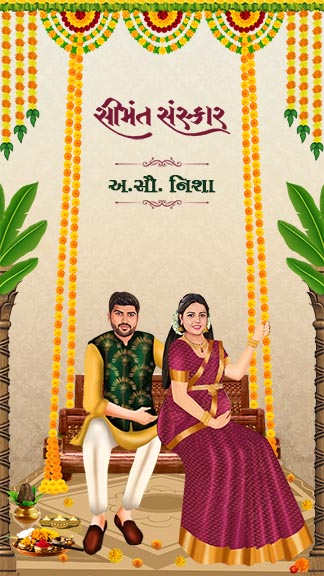
Welcoming a new life into the family is a momentous occasion, filled with joy, traditions, and cultural significance. One such cherished tradition in Indian culture is the Seemantham ceremony, a celebration held to bless the expecting mother and her unborn child. Crafting the perfect Seemantham invitation in English is essential to convey the event’s importance and ensure that friends and family are warmly invited to partake in this joyous ritual. In this article, we will explore the nuances of creating a Seemantham invitation in English, offering insights, tips, and examples to help you design a heartfelt and memorable invitation.
Understanding Seemantham: A Cultural Overview
What is Seemantham?
Seemantham, also known as Seemantha, is a traditional Hindu ceremony celebrated in South India, particularly among Tamil and Telugu communities. It is akin to a baby shower in Western cultures but is deeply rooted in Vedic rituals and customs. The ceremony is typically held during the seventh or ninth month of pregnancy to bless the expecting mother and ensure the well-being of both mother and child.
Historical and Cultural Significance
The origins of Seemantham can be traced back to ancient times when it was believed that the fetus could hear and absorb positive vibrations. The ceremony involves various rituals, including Vedic chants, to invoke divine blessings. It is a way for the family to express their joy and seek protection for the unborn child. The Seemantham is also an opportunity for the mother to receive gifts, blessings, and support from her loved ones.
The Importance of Seemantham Invitations
Why Invitations Matter
Invitations play a crucial role in any celebration, and Seemantham is no exception. A well-crafted Seemantham invitation in English not only informs guests about the event but also sets the tone for the ceremony. It reflects the cultural heritage, the family’s joy, and the significance of the occasion. An invitation is the first glimpse guests get of the event, making it essential to convey warmth, respect, and excitement.
Traditional vs. Modern Invitations
Traditionally, Seemantham invitations were handwritten or printed on simple cards with religious symbols and motifs. However, with the advent of digital media, invitations have evolved. Modern Seemantham invitations can be elaborate, featuring intricate designs, vibrant colors, and personalized messages. Whether you choose a traditional or contemporary style, the key is to maintain the essence of the ceremony.
Elements of a Seemantham Invitation
Key Information to Include
When creating a Seemantham invitation in English, ensure that the following information is clearly stated:
- Names of the hosts: Typically, the grandparents or parents of the expecting mother.
- Date and Time: Clearly mention the day, date, and time of the ceremony.
- Venue: Provide the complete address and any additional instructions for reaching the location.
- RSVP Details: Include contact information for guests to confirm their attendance.
- Dress Code: If there is a specific dress code, mention it to guide the guests.
- Special Instructions: Any other relevant information, such as gift preferences or ceremony specifics.
Design and Aesthetics
The design of your invitation should reflect the cultural significance of Seemantham while being aesthetically pleasing. Consider using traditional motifs such as lotus flowers, elephants, or paisleys. Incorporate colors that symbolize prosperity and joy, like gold, red, and green. Ensure that the text is legible and the layout is organized.
Crafting the Perfect Seemantham Invitation in English
Language and Tone
The language used in your invitation should be formal yet warm. It should convey respect for the guests while expressing the family’s happiness. Avoid overly complex language; instead, opt for simple, heartfelt wording. The tone should be inviting and celebratory, reflecting the joyous nature of the event.
Wording Examples
Here are a few wording examples to inspire your Seemantham invitation in English:
Example 1:
With the blessings of the Almighty, we are delighted to invite you to the Seemantham ceremony of our beloved daughter [Mother's Name]. Please join us as we celebrate this joyous occasion and seek blessings for her and the little one.
Date: [Date]
Time: [Time]
Venue: [Address]
We look forward to your presence and blessings.
RSVP: [Contact Information]
Example 2:
We are overjoyed to announce the Seemantham ceremony of our cherished daughter [Mother's Name]. Please grace us with your presence as we celebrate this beautiful milestone and pray for her and the unborn child's well-being.
Date: [Date]
Time: [Time]
Venue: [Address]
Your blessings and presence mean the world to us.
RSVP: [Contact Information]
Tips for Designing Your Invitation
Choosing the Right Template
Selecting the right template is crucial for creating a visually appealing invitation. Many online platforms offer customizable templates specifically designed for Seemantham ceremonies. Choose a template that aligns with your aesthetic preferences and the ceremony’s theme.
Personalization Ideas
Personalizing your invitation can make it more special. Consider adding elements like:
- Photos: Include a picture of the expecting mother or a family photo.
- Quotes or Verses: Incorporate meaningful quotes or verses from religious texts.
- Custom Artwork: Commission custom artwork that reflects the cultural aspects of Seemantham.
Sending Out Your Seemantham Invitations
Timing and Etiquette
Timing is crucial when sending out invitations. Aim to send them at least 3-4 weeks in advance to give your guests ample time to plan. Follow up with a reminder a week before the event. When addressing the invitations, use formal titles and names to show respect.
Digital vs. Physical Invitations
In the digital age, many prefer sending e-invites due to their convenience and eco-friendliness. However, physical invitations still hold charm and can be cherished as keepsakes. Choose the format that best suits your preferences and the preferences of your guests.
Common Mistakes to Avoid
Pitfalls in Invitation Design
Avoid cluttering your invitation with too much information or overly complex designs. Keep it simple, elegant, and focused on the essential details. Ensure that the text is easy to read and the design complements the overall theme.
Wording Errors to Watch Out For
Double-check all the information on your invitation to avoid errors. Common mistakes include incorrect dates, misspelled names, and unclear addresses. Proofread multiple times and, if possible, have someone else review it before finalizing.
Conclusion
Creating the perfect Seemantham invitation in English involves a blend of tradition, creativity, and attention to detail. By understanding the cultural significance, focusing on key elements, and avoiding common mistakes, you can design an invitation that beautifully conveys the joy and importance of the occasion. Whether you choose a traditional or modern style, the goal is to make your guests feel welcomed and honored to be part of this special celebration.
FAQs
What is the best time to send out Seemantham invitations?
The best time to send out Seemantham invitations is 3-4 weeks before the ceremony to give your guests ample time to plan and RSVP.
Can I send digital Seemantham invitations?
Yes, digital invitations are a popular and eco-friendly option. They are convenient to send and receive, and you can easily track RSVPs.
Should I include a dress code in the invitation?
Including a dress code is optional but can be helpful for guests. If there is a specific attire you would like your guests to wear, mention it in the invitation.
What kind of design elements should I include in a Seemantham invitation?
Incorporate traditional motifs, vibrant colors, and symbols that reflect the cultural significance of Seemantham. Ensure that the design is elegant and complements the overall theme of the ceremony.
How can I personalize my Seemantham invitation?
Personalize your invitation by adding photos, meaningful quotes or verses, and custom artwork that reflects the cultural aspects of Seemantham.






